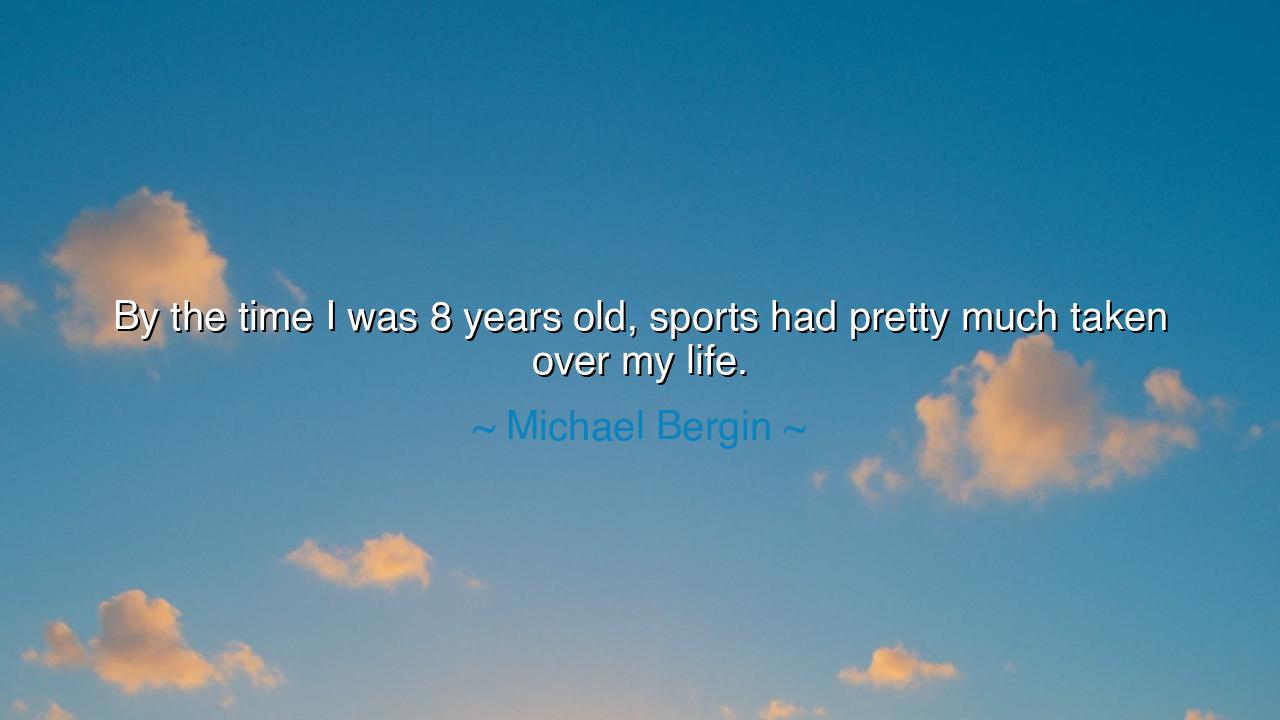
By the time I was 8 years old, sports had pretty much taken over






When Michael Bergin reflects, “By the time I was 8 years old, sports had pretty much taken over my life,” his words carry the echo of an early calling, a passion that claimed him before the age when most children are still wandering in play. This is not a casual remark, but a revelation of how swiftly life can shape us, how destiny can seize the young and bind them to a path of discipline, sweat, and longing. It speaks of the power of passion, which, when it takes root early, becomes not just pastime but identity.
The origin of this quote lies in Bergin’s youth, where sports became more than mere games—they were his school of life. To say “taken over” is to admit surrender, but it is not surrender to weakness, rather to greatness. For in the hours spent training, in the endless contests, in the victories and defeats, the child discovered the man he would become. Sports did not simply fill his days; they commanded them, turning boyhood into a furnace where resilience, courage, and discipline were forged.
History reminds us of others who were likewise claimed by their passion early. Consider Mozart, who at the age of five was already composing, the weight of destiny pressing upon him as surely as Bergin felt the pull of sport. Or think of Alexander the Great, who, as a child, was tamed by the horse Bucephalus—a moment that revealed both his courage and his fate. Such stories show that when a calling enters young, it seizes not only time but the soul itself, directing one’s course long before the world understands it.
This quote also reveals the double-edged nature of such devotion. To be overtaken by something at a tender age can bring greatness, but it can also bring burden. For childhood is meant for freedom, yet for those with destiny, freedom often yields to discipline. Bergin’s words hint at the all-consuming power of passion: once chosen, it leaves little room for wandering. Yet it is this same consuming fire that drives ordinary lives into extraordinary stories.
In hearing this, we must reflect on our own lives. Have we allowed our passions to claim us, or have we hidden them away? To have something “take over your life” is not a curse but a blessing, if it is a worthy pursuit. Many wander aimlessly into adulthood, never seized by anything strong enough to shape them. Bergin’s testimony teaches us the importance of embracing the forces that call to us early, for they may be the compass pointing us to our true north.
The lesson is clear: when passion seizes you—whether in childhood or later—do not resist it, but shape it, discipline it, and let it discipline you in return. For greatness comes not from dabbling lightly in many things, but from surrendering wholly to one thing that stirs your soul. Parents and teachers, too, must learn from this: to recognize early passions in the young and nurture them, lest the flame be quenched by neglect or fear.
Therefore, let the hearer of this teaching take courage. If something has “taken over your life” in the way that sports did for Bergin, rejoice. For you have found what many seek but never discover. Direct it wisely, tend it faithfully, and it will bear fruit beyond your imagining. Remember always his words: “By the time I was 8 years old, sports had pretty much taken over my life.” Let them remind you that destiny often begins not in the years of maturity, but in the fragile, fiery heart of youth.






AAdministratorAdministrator
Welcome, honored guests. Please leave a comment, we will respond soon